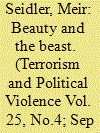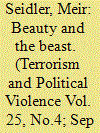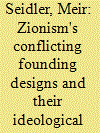| Srl | Item |
| 1 |
ID:
123059


|
|
|
|
|
| Publication |
2013.
|
| Summary/Abstract |
The article deals with the intellectual and philosophical background of Sartre's thought, which made him susceptible to the influence of left-wing totalitarian structures in general and to left-wing terrorism in particular. Consequently it is argued that Sartre's identification with Stalinism in his younger years, and his later sympathies with the infamous German Baader-Meinhof terrorist gang, were more than mere expressions of his personality, but rather part and parcel of his special blend of existentialism and philosophy. At the end of the article, Sartre's position in this matter is contrasted with the position of another existentialist French thinker, Sartre's contemporary, Albert Camus.
|
|
|
|
|
|
|
|
|
|
|
|
|
|
|
|
| 2 |
ID:
124920


|
|
|
|
|
| Publication |
2013.
|
| Summary/Abstract |
The article deals with the intellectual and philosophical background of Sartre's thought, which made him susceptible to the influence of left-wing totalitarian structures in general and to left-wing terrorism in particular. Consequently it is argued that Sartre's identification with Stalinism in his younger years, and his later sympathies with the infamous German Baader-Meinhof terrorist gang, were more than mere expressions of his personality, but rather part and parcel of his special blend of existentialism and philosophy. At the end of the article, Sartre's position in this matter is contrasted with the position of another existentialist French thinker, Sartre's contemporary, Albert Camus.
|
|
|
|
|
|
|
|
|
|
|
|
|
|
|
|
| 3 |
ID:
118541


|
|
|
|
|
| Publication |
2012.
|
| Summary/Abstract |
The article deals with two different approaches to the Zionist enterprise that clearly dominated nearly all of the stages of its development: viewing any envisioned return of the Jews to the Land of Israel through a traditional redemptionist prism and a novel perception seeking refuge for a persecuted people. Though the historical schism and the ideological gap between both perceptions are obvious, I try to demonstrate that in terms of real-life ideologies they at times worked hand in hand. The refuge position was neither the exclusive domain of secular Zionists, nor was its redemptionist counterpart limited to the proponents of religious Zionism. Sometimes both positions are echoed by one and the same person. Furthermore, an intermediate position is presented and the reasons for its meager success are scrutinized. The main protagonists here are Herzl, Rabbi Kook, Rabbi Reines, and Ahad Ha'am.
|
|
|
|
|
|
|
|
|
|
|
|
|
|
|
|